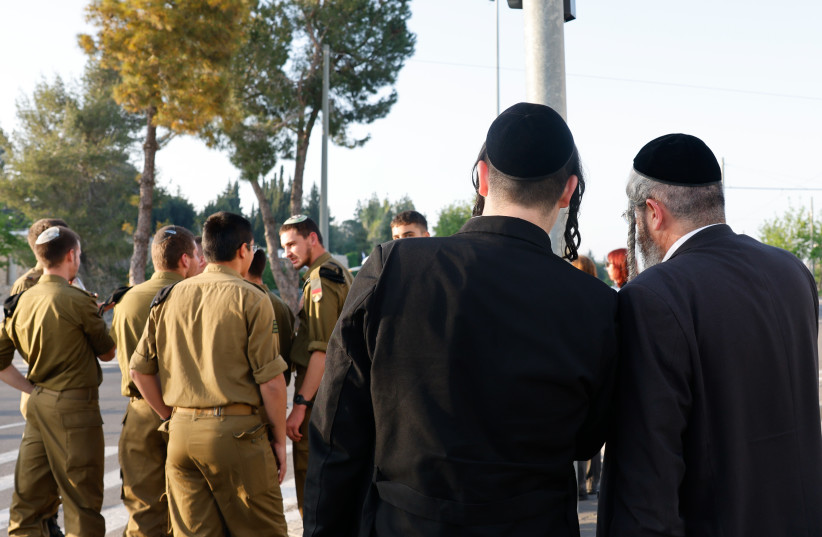Party leaders from Israel's pre-war coalition (not including National Unity) did not speak publicly on Thursday about an ultimatum that Defense Minister Yoav Gallant set in a statement on Wednesday evening, whereby his ministry would not put forward a new law proposal to enlist haredi men into the IDF unless the proposal is accepted by all of the members of the coalition, including National Unity chairman MK Benny Gantz.
The statement effectively meant that Gantz, who presented a plan on Monday in which all haredi and Arab-Israeli men would serve either in the IDF or in another form of national service, will have veto power over such a proposal, and the pre-war coalition will not be able to attempt to continue the existing blanket exemption for the two groups. The statement also gives the haredi parties veto power, so the coalition will not be able to attempt a solution against their wishes.
While Gantz answered immediately with a statement that he would "act together with the defense minister, with all of the parties in the Knesset, and with all of Israeli society" in order to put forward a plan, the party leaders from the pre-war coalition remained mum throughout the day on Thursday.
Gallant's statement added fuel to an issue that is quickly becoming a political landmine, as the war and a Supreme Court case against the haredi exemption have come together to create the perfect storm.
After receiving numerous delays, a new conscription bill from 2017 that was deemed unconstitutional expired at the end of June 2023, and therefore, there is no current legal basis for haredi exemption.

The government decided last year that it would put forward a new plan by the end of March 2024. However, the war that broke out on October 7 has pushed off the preparations for such a plan, and if no other government decisions are made, the state may be legally required to draft haredi men beginning on March 31.
Conditional orders issued by Supreme Court
The Supreme Court issued a series of conditional orders on Monday for the state to put forward its case why it should receive another extension. Haredi yeshivot (torah study academies) also rely on the 2017 bill to receive government funding, and the Supreme Court also demanded that the state explain why funding will cease on April 1.
Some haredi leaders from the Sephardic Shas party have expressed their support for haredi men who are not studying in yeshivot to join the IDF. The Ashkenazi-haredi party United Torah Judaism, however, has traditionally been more opposed to national service.
UTJ MK Moshe Gafni and Shas chairman MK Aryeh Deri met on Wednesday in order to discuss the issue, and have yet to respond publicly.
Gantz and fellow National Unity Minister-without-portfolio Gadi Eisenkot presented on Monday a plan that would require all Israelis at age 18, including haredim and Arab Israelis, to serve either in the IDF or in civil national service.
Yisrael Hayom reported on Wednesday that a "senior UTJ official" had reached out to Gantz and Eisenkot and said that the plan was acceptable to them, but with the significant caveat that it would not draft anyone by force, and allow for anyone who wanted to study in yeshiva to be able to do so.
